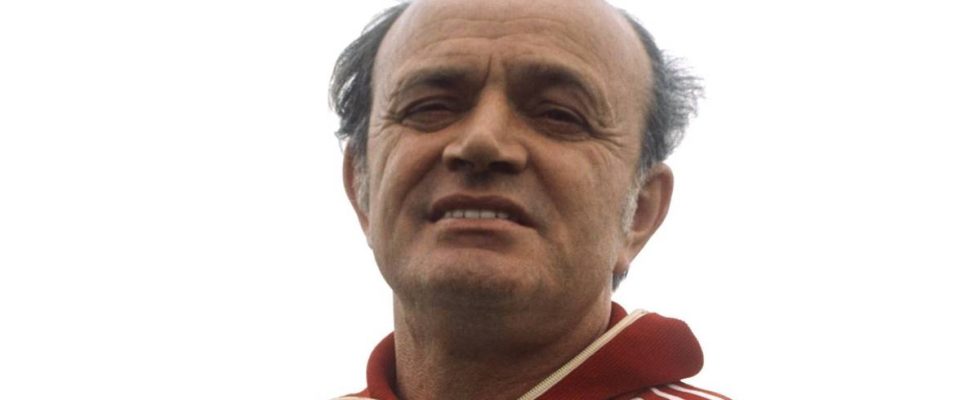Every German football fan knows Alfred Preißler’s most famous saying, at least the second half of it.
{ “placeholderType”: “MREC” }
“Grey, dear friend, is all theory and green is life’s golden tree”: The famous sentence by the devil figure Mephistopheles from Goethe’s Faust was obviously the inspiration for the German football legend when she reflected on sport and life.
“All theory in life is gray,” Preißler also found, but replaced the green and gold tree with prosaic Ruhrpott wisdom: “All theory in life is gray, but the decisive factor is on the pitch.”
{ “placeholderType”: “MREC” }
With such old quotes, you never really know for sure whether they were actually said that way. But one thing is certain: the decisive factor is on the pitch – football and many other things can hardly be summed up better than with these four (or five?) words.
And there is no better way to sum up what “Adi” Preißler stood for, the great footballer and coach who would have been 103 years old today and not only had a decisive influence on the Borussia Dortmund myth.
Adi Preißler: From a simple worker to a football idol
Preißler, born on April 9, 1921 in Duisburg, is a simple man: a trained mechanic, technical employee, drafted by Hitler’s Wehrmacht in the Second World War and sent to the Russian campaign.
The young football talent is lucky to survive the criminal madness (unlike millions of other German soldiers and tens of millions of people in the former Soviet Union). His sporting talent then brought him national fame in post-war Germany.
{ “placeholderType”: “MREC” }
Preißler went to Borussia Dortmund for the first time after the end of the war because his future wife came from there and there was good pay, at that time still partly in food rations.
In 1949, Preißler scored 25 goals to help BVB win the title in the Oberliga West and their first final for the German championship – narrowly lost 2-3 after extra time against VfR Mannheim. A year later, Preißler made a move that caused similar regional waves as a transfer of a top BVB player to Schalke or Bayern would have done later.
From the “super team” Preußen Münster back to BVB
SC Preußen Münster attracts Preißler, an ambitious club that is putting together a “super team” at the beginning of the economic miracle decade that will lead the university town to the German football throne.
The club chairman and building contractor Josef “Grandpa” Oevermann lures Preißler – supported by an association of local industrial and trading giants – with an incredible 10,000 German marks and the lease of a gas station. Preißler is now storming alongside four other offensive stars of his generation – Josef Lammers, Siegfried Rachuba, Rudi Schulz and Felix “Fiffi” Gerritzen. The mythical “100,000 Mark Storm”.
Preißler also reached the German final with Münster, but lost again in 1951. In front of over 100,000 fans in Berlin’s Olympic Stadium, 1. FC Kaiserslautern won 2-1. A year later, feelings of home drove Preißler back to Dortmund – where he finally created his great legacy, which is still honored today.
“Three Alfredos” shoot Dortmund to their first German championship title
At BVB, Preißler will once again be part of a legendary strike group with a wonderful name: the “three Alfredos” – Alfred Kelbassa, Alfred Niepieklo, Alfred Preißler. The latter is now the undisputed crowd favorite and the team’s leading player.
In 1956 the crowning glory came with a 4-2 win against Karlsruher SC, with all three Alfredos scoring. Among the more than 70,000 spectators in Berlin is Hollywood superstar Gary Cooper, who is there as a guest at the Berlin Film Festival, which is running at the same time.
Preißler holds up the first championship trophy in BVB history and promises: “Friends, we’ll get the cake plate again next year!” Then they do it.
Thanks to the two titles – and the fact that BVB also surpassed local rivals Schalke at the time – Preißler became a BVB icon who is still revered today.
Adi Preißler celebrates Dortmund’s 1957 championship
BVB honors memories to this day
Despite his success and impressive goal rate (168 goals in 289 games for BVB), Preißler never made it into the national team. Under national coach Sepp Herberger he couldn’t get past Fritz Walter and Max Morlock, only played two international matches and wasn’t part of the 1954 world champion team.
In Dortmund it did not diminish his fame, the more his hero myth belonged entirely to them, or almost entirely: Rot-Weiß Oberhausen also admire Preißler, who led Dortmund’s local rivals to their only promotion to the Bundesliga in 1969. In 2004, RWO Preißler – after his playing and coaching career, a sports teacher in the Niederrhein youth village in Moers until 1987 – was named his coach of the century.
Adi Preißler died on July 15, 2003 at the age of 82, and the BVB fans honored him with a choreography on the following match day. The city of Dortmund also cherishes the memory of his idol: the entrance to the Dortmund training ground in the Brackel district now bears the name Adi-Preißler-Allee.

